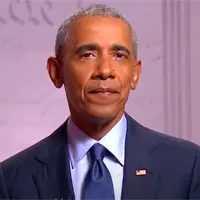Obama, unplugged: Former president adapted his soaring oratorical style to a quiet museum room
-

Barack Obama became a national figure speaking at the 2004 Democratic National Convention. Sixteen years later, "he stood in the Museum of the American Revolution in Philadelphia — alone, like nearly every convention speaker in the pandemic," says James Poniewozik. "There were no cheers, no placards, no responses to his calls. There was just the same speaker, older, sadder, but trying to convince his audience that, if they acted urgently, his 2004 faith could still be borne out. It was a Barack Obama quieter and louder than we had heard before. The audacity of hope was tempered by the veracity of the stakes. This year’s convention, given the restrictions of the pandemic, has raised the challenge: How do you electrify an empty room? The speakers and producers have tried virtual applause, talk-show intimacy and eclectic locations. Mr. Obama’s answer was to use the silence as his amplifier. Watching Mr. Obama adapt his soaring oratorical style to the chill of a museum room was like watching a veteran arena act play an acoustic set. Obama, unplugged. Gone was the ringing peroration and crescendo. Instead, he used the negative space and stillness as much as the words. He deployed micro-pauses for urgency and for emphasis: 'Donald Trump hasn’t grown into the job (pause) because he can’t.' The sentence hung between 'job' and 'because' like an ax at the top of its arc, just before the blow. It was an expert example of what does and doesn’t work in this constricted environment. Deep emotion, yes; canned zingers, not as much. Sincerity, not snark. It draws on the skill set for giving a fireside chat — or a eulogy." Obama's speech was in stark contrast to Kamala Harris' speech. "The final speaker of the night, Senator Kamala Harris, also has a talent for soaring speeches to crowds, and she was making history just as Mr. Obama did in 2008," says Poniewozik. "You could imagine her speech, which combined sharp attacks with a vision of an inclusive future, delivered to a big, celebratory crowd. There couldn’t be one. But whoever staged the speech set it as if they didn’t realize that, having the nominee address an auditorium mostly empty except for a few journalists and a video grid of teleconferenced-in supporters. You could feel the gaps where laughter and cheers should have been, as if watching the soundcheck run-through."
ALSO:
- Watching Obama's speech sped up, you'll notice how the camera zooms in on his face: "Something you maybe didn't notice because it happened over the course of 20 minutes: the camera slowly zooming in on Obama, enhancing the effect that he was speaking directly to you about something of grave importance," says Timothy Burke.
- The Democrats made a mistake having Kamala Harris speak after former President Barack Obama: Originally, Obama was supposed to speak after Harris, but he reportedly suggested flipping the order so as to pass the torch. The former president put the vice presidential candidate in an "impossible position" after his stellar speech.
- Why did Harris' virtual audience have some people featured multiple times on screen?
- Elizabeth Warren hid a Black Lives Matter Easter egg during her speech, but some complained she was using the movement as a prop
- Hillary Clinton was one of the nights "losers" because she gave a very short speech and didn't make the main hour of the DNC
- Secretary of State Mike Pompeo tweeted a GIF of Lisa Simpson crying and ripping up papers during Nancy Pelosi's DNC speech
- Night 3 Host Kerry Washington reconnected with her 8th grade constitutional law class teacher during last night's virtual convention
TOPICS: Barack Obama, Elizabeth Warren, Hillary Clinton, Joe Biden, Kamala Harris, Kerry Washington, Mike Pompeo, 2020 Presidential Election, Coronavirus
More Barack Obama on Primetimer:- Who is Jho Low and where is he now? All we know about Pras Michel co-conspirator as rapper sentenced to 14 years over illegal Obama donations
- Is Consequence Culture different from Cancel Culture? Term goes viral in the wake of cancellation of Jimmy Kimmel's show
- False Erika Kirk statement saying she “redownloaded Tinder” after Charlie Kirk death sparks backlash
- Barack Obama goes viral for winning his third Emmy
